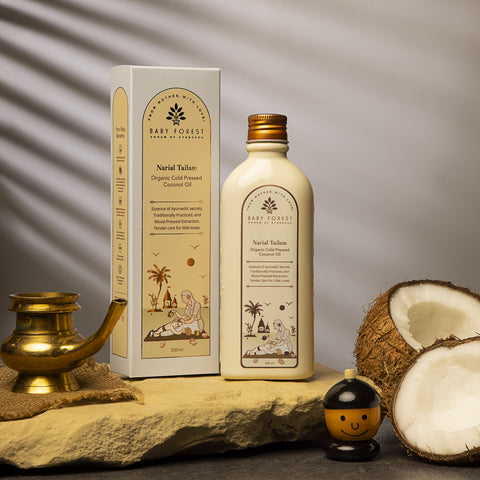
Understanding PURPLE Crying: A Complete Guide for New Parents


Essential Oils Benefits for Babies: A Complete Guide for ...

Newborn’s First 24 Hours: Essential Guide and Tips

Here Are The Best Ways to Treat Diaper Rashes: Home Remedies

The Benefits of Using Dry Sheets in Diaper Changing and S...

Benefits of Baby Rose Water for Your Little One

Home Remedies for Babies! As Grannies Knows the Best!

5 Must-Know Tips For Your Baby’s First Winter

Essential Tips for a Perfect Beach Day with Kids this Summer

Gentle Cleaning: Tips for Using Baby-Safe Liquid Detergent

Which Baby Body Wash Is Right for Your Little One?

What is the Difference Between Natural Fragrance and Adde...

How to Choose the Right Pacifier for Your Baby's Comfort ...

The Benefits of Regular Baby Massages - A Parent's Guide

Top Summer Baby Care Essentials for Your Little One

Benefits of Baby Massage for Newborns - A Guide on How to...

Essential Products for Winter - Your Comprehensive Checkl...

The Ultimate Guide to Baby Face Creams

Effective Tips for Managing Bedwetting

Common Skin Conditions in Babies: An Expert Guide for Par...

Best Ways to Get Rid of Mosquitoes This Monsoon

Why Talc-Free Baby Powder Is the Ideal Choice for Infants

07 Things to Know Before You Buy a Baby Cradle in India

Prepare Your Baby for Winter: Tips for Dry Skin Care

A Healthy Night Routine For Your Baby's Good Sleeping Habits

Dealing with Cradle Cap: Causes, Treatment Options, and P...

Must-Have Baby Essentials for a Safe and Comfortable Monsoon

Baby Bath Ritual: An Essential Ritual for Baby’s Growth &...

The Benefits of Using Water Wipes for Your Baby's Delicat...

How to Pick Safe Essential Baby Care Products

Tips to Choose the Best Baby Lotion For Your Newborn

A Comprehensive Guide To Choose The best pillow for your ...

Shishu Abhyanga (Baby Oil Massage): The Ancient Ayurvedic...

The Importance of Using a Gentle Comb for Your Baby's Hair

The Essential Guide to Perfect Swaddling: Techniques and ...

Why Talc-Free Baby Powder is a Must for Summer Heat?

The Ultimate Baby Bathing Checklist for Your Baby's First...

Winter Dry Skin in Babies: Why Lotion is a Must-Have This...

Baby Loi Ubtan: Traditional & Modern Care for Stylish Moms

Does Your Baby Need Face Cream? Here's What You Should Know

How to Soothe Your Newborn's Hiccups

What to Do When Your Baby's Tummy is Upset

How to Perform an Abhyanga Massage for Babies

Exploring the Benefits of Lavender Oil for Babies

Top Tips for Choosing the Safest and Most Comfortable Bab...

Why Is My Baby Sneezing So Much? Understanding Newborn Co...

How to Create a Simple Baby Skincare Routine this Winter

Avocado Oil For Babies: Gentle Benefits Of Nourishing Oil

How to Use Baby Vapour Rub for Cough Relief

Benefits of Eucalyptus Oil in Baby Products: A Natural Ch...

Mustard Seeds Pillow Benefits: Ideal for Your Newborn's C...
Because so many household goods include chemicals, it is essential that we put our children's health first when it comes to the purity of the products they use. Whether your kid is seven days, seven weeks, or seven months old, one thing remains constant: their sensitive and gentle skin. As a result, many bath and skin care products you use on yourself might cause rashes and irritation. Parents have become increasingly mindful of choosing baby products, which has led to a growing preference for natural baby products.
Bathing your baby is not just a task but a nurturing experience for their well-being. This blog will help you understand the benefits of choosing natural baby soaps and provide guidance on how to select the best soap for infants, guaranteeing a chemical-free bathing experience.
Our skin is the biggest part of our body that shields our insides from the outside world. This is especially important for babies because their skin is significantly thinner than that of adults. This makes a baby's skin more delicate and also lets chemicals from normal soap get into the skin more easily. One study found that babies exposed to harsh soaps and shampoos are more likely to get skin problems like eczema and other skin irritations.
This is where natural baby soaps help with their organic ingredients, which makes it safer with no synthetic smells or harsh chemicals in them. These soaps only contain natural ingredients like coconut oil and shea butter. These natural ingredients are gentle and soft on a baby's skin.
Choosing the right natural baby soap is crucial for your little one's delicate skin. With so many alternatives available, it might be difficult to choose the best one. However, focusing on specific qualities and ingredients can guide you in making a healthier choice for your baby. Here's how to ensure the soap you select is gentle, safe, and beneficial for your baby's bath time.

To use the soap bar, simply wet your baby's skin with warm water, then gently rub the soap bar over their skin to create a soft lather. Massage the lather gently across their body with your hands or a soft washcloth. After ensuring their skin is thoroughly cleansed, rinse off the lather with plenty of water, making sure no soap residue remains.
When choosing baby care products, it's important to consider your child's well-being and the environment. Natural baby soaps are a great option, as they are gentle on your baby's skin and free from harsh chemicals. This helps create a safe and enjoyable bathtime experience for your little one. By choosing natural products, you're also contributing to a more sustainable world, reducing your exposure to harmful chemicals. This is a worthwhile investment in your child's health and the future of our planet.

